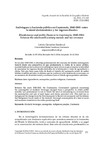Identificador persistente para citar o vincular este elemento:
https://accedacris.ulpgc.es/jspui/handle/10553/12808
| Campo DC | Valor | idioma |
|---|---|---|
| dc.contributor.author | González Sandoval, Leticia | en_US |
| dc.date.accessioned | 2015-02-14T03:30:29Z | - |
| dc.date.accessioned | 2018-03-15T14:28:51Z | - |
| dc.date.available | 2015-02-14T03:30:29Z | - |
| dc.date.available | 2018-03-15T14:28:51Z | - |
| dc.date.issued | 2014 | en_US |
| dc.identifier.issn | 1133-598X | en_US |
| dc.identifier.uri | https://accedacris.ulpgc.es/handle/10553/12808 | - |
| dc.description.abstract | En los años 1840-1865, el abordaje gubernamental del consumo de bebidas embriagantes transitó desde una perspectiva en que predominaba la visión de la moral pública, escandalizada por los excesos en la embriaguez, hacia otra en la que se impuso la necesidad de maximizar los ingresos fiscales derivados de la fabricación y venta de aguardiente y chicha. Este giro tiene como telón de fondo el tránsito del monopolio estatal de ambas bebidas al ámbito privado y la defensa que los pueblos de indios hicieron de su consumo, en un momento de transición social y económica hacia el Estado agroexportador cafetalero. | en_US |
| dc.description.abstract | Between the years 1840-1865, the Guatemalan Government approach concerning the consumption of alcoholic beverages changed from a perspective in which public morality was predominant to one in which the need of maximizing tax revenues from the manufacture and sale of hard liquor and chicha prevailed over. This shift has as background the change from the State monopoly to the private monopoly and the defense that indigenous towns made of the alcoholic beverages consumption, at a time of social and economic transition to the coffee-producing State. | en_US |
| dc.format | es | |
| dc.language | spa | en_US |
| dc.relation.ispartof | Vegueta: Anuario de la Facultad de Geografía e Historia | en_US |
| dc.source | Vegueta [ISSN 1133-598X], n. 14, p. 271-288, (2014) | en_US |
| dc.subject | 330901 Bebidas alcohólicas | en_US |
| dc.subject.other | Aguardiente | en_US |
| dc.subject.other | Monopolios | en_US |
| dc.subject.other | Pueblos indígenas | en_US |
| dc.subject.other | Guatemala | en_US |
| dc.subject.other | Alcoholic beverages | en_US |
| dc.subject.other | Monopolies | en_US |
| dc.subject.other | Indigenous peoples | en_US |
| dc.title | Embriaguez y hacienda pública en Guatemala, 1840-1865: entre la moral decimonónica y los ingresos fiscales | en_US |
| dc.title.alternative | Drunkenness and public finances in Guatemala, 1840-1865: between the nineteenth-century morals and tax revenues | en_US |
| dc.type | info:eu-repo/semantics/article | en_US |
| dc.type | Article | en_US |
| dc.compliance.driver | 1 | es |
| dc.identifier.absysnet | 234500 | - |
| dc.description.lastpage | 288 | en_US |
| dc.identifier.issue | 14 | - |
| dc.description.firstpage | 271 | en_US |
| dc.investigacion | Artes y Humanidades | en_US |
| dc.rights.accessrights | info:eu-repo/semantics/openAccess | es |
| dc.type2 | Artículo | en_US |
| dc.description.numberofpages | 18 | en_US |
| dc.utils.revision | Sí | en_US |
| dc.identifier.ulpgc | Sí | en_US |
| dc.description.esci | ESCI | |
| dc.description.dialnetimpact | 0,0 | |
| dc.description.dialnetq | Q4 | |
| dc.description.erihplus | ERIH PLUS | |
| item.fulltext | Con texto completo | - |
| item.grantfulltext | open | - |
| Colección: | Artículos Vegueta. n.14, 2014 | |
Visitas
50
actualizado el 11-ene-2026
Descargas
596
actualizado el 11-ene-2026
Google ScholarTM
Verifica
Comparte
Exporta metadatos
Los elementos en ULPGC accedaCRIS están protegidos por derechos de autor con todos los derechos reservados, a menos que se indique lo contrario.
